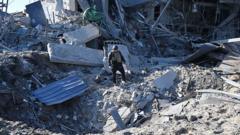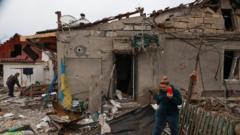Russian President Vladimir Putin has called for a temporary "Easter truce" in Ukraine until the end of Sunday, but Ukrainian officials caution against trust in his motives.
Easter Truce Declared by Putin as Ukraine Remains Skeptical

Easter Truce Declared by Putin as Ukraine Remains Skeptical
Putin's announcement of a temporary ceasefire is met with distrust from Ukraine amid ongoing military tensions.
Putin has ordered his forces to "stop all military activity" in Ukraine for a total of 30 hours, explicitly stating that Russian troops should remain vigilant for any potential violations of this ceasefire. The announcement came during a meeting with his chief of general staff, Valery Gerasimov, who acknowledged it was made "based on humanitarian considerations." The truce is set to last until 22:00 BST on Sunday (00:00 Moscow time). Putin is hopeful that Ukraine will reciprocate the ceasefire; however, this sentiment is not echoed by Ukrainian President Volodymyr Zelensky, who condemned the declaration as little more than a strategic ploy that undermines the sanctity of human life during Easter.
Despite Putin's announcement, Zelensky reported the identification of Russian drones operating in Ukraine's airspace shortly before the truce was scheduled to commence, highlighting concerns about Russian intentions. Ukraine's Foreign Minister Andriy Sybiha pointed out the discrepancy between Putin's words and actions, calling into question the trustworthiness of the Russian leader. While Ukraine had previously accepted a US proposal for a 30-day ceasefire, Sybiha remarked on the incongruity of “30 hours instead of 30 days,” noting the historical unreliability of Putin's commitments.
The Russian Defense Ministry stated that its troops would comply with the truce only if it was respected by Ukrainian forces, but both nations have seen past ceasefires fail, including an earlier attempt during Orthodox Christmas in January 2023. As tensions continue, the United States has been engaged in discussions with Russia to explore possible paths to end the conflict, but progress remains elusive. Following a lack of agreement on a full and unconditional ceasefire, U.S. President Donald Trump signaled that without swift advancements, the U.S. would cease to broker further talks, emphasizing the urgency to reach a resolution or refocus on other priorities.
Despite Putin's announcement, Zelensky reported the identification of Russian drones operating in Ukraine's airspace shortly before the truce was scheduled to commence, highlighting concerns about Russian intentions. Ukraine's Foreign Minister Andriy Sybiha pointed out the discrepancy between Putin's words and actions, calling into question the trustworthiness of the Russian leader. While Ukraine had previously accepted a US proposal for a 30-day ceasefire, Sybiha remarked on the incongruity of “30 hours instead of 30 days,” noting the historical unreliability of Putin's commitments.
The Russian Defense Ministry stated that its troops would comply with the truce only if it was respected by Ukrainian forces, but both nations have seen past ceasefires fail, including an earlier attempt during Orthodox Christmas in January 2023. As tensions continue, the United States has been engaged in discussions with Russia to explore possible paths to end the conflict, but progress remains elusive. Following a lack of agreement on a full and unconditional ceasefire, U.S. President Donald Trump signaled that without swift advancements, the U.S. would cease to broker further talks, emphasizing the urgency to reach a resolution or refocus on other priorities.





















